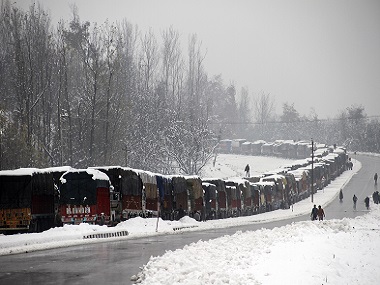The snowfall in Kashmir usually begins in late December, timed with the onset of Chali-Kalan, the 40-day period that marks the coldest time in winter. Over the past two years, however, no snowfall has been recorded till late January. So it was with some surprise that Kashmiris welcomed the first snow of the season on Saturday, 3 November. There were photos taken, videos uploaded to social media — a celebratory air. Just hours later, that feeling had vanished. Air and land transport between Kashmir and the rest of India was suspended, and the Valley plunged into darkness as the electric supply collapsed under just two inches of snow. When Kashmiris took to social media this time round, it was to critique the government for failing the people yet again. “Exam season is on in Kashmir and students have been troubled by the lack of electricity,” said a resident of the Valley, Basharat Ahmad. Older Kashmiris said they didn’t recollect when the Valley witnessed such an early snowfall. Abdul Hameed, from Anantnag, said: “I have seen this kind of snowfall for the first time in my life. The climate usually stays dry till late December. And in December and January, the snow comes as blessing for the Valley — especially its farmers and fruit growers.” [caption id=“attachment_5507331” align=“alignnone” width=“825”]
 As the untimely snow covered Kashmir over Saturday, life came to a halt. Photo by Sameer Mushtaq[/caption] In Kashmir, autumn lasts from August to mid-November. This is also known as the ‘golden season’, during which farmers harvest their crops and stock up on food for the winter season. Many fruit growers were yet to pluck their produce — like apples — and pack them for exporting, when the snowfall began over the weekend. Now they worry about the fate of their fruit. Even those who have already sold their produce across markets in India are facing damage to their orchards, due to the untimely snow. Some orchards have been completely devastated. Gh Mohiudeen lives in a far-flung area of South Kashmir. His family’s livelihood depends on their 1,500 sq mt apple orchard. Most of Mohiudeen’s apple trees were damaged in the snowfall, and the patriarch says he feels like everything has been lost. “This piece of land came to me after decades of work; it’s the only ‘asset’ we have. I never thought it would meet this fate,” Mohiudeen says. Experts said that snow in late November was not uncommon, but was an outlier this early in the month. The last time Kashmir received snow in early November was in 2008. “The past few years have normalised warm winters and autumns, as a result of which, people haven’t harvested their fruits on time,” said Shakil Ahmad Ramshoo, professor and head of Earth Sciences, University of Kashmir. “Warm winters are an indication of climate change. Kashmir has erratic weather that can be attributed to global warming.” As Saturday’s snowfall engulfed the Valley, passengers were stranded on the routes to and from Kashmir. Reports stated that more than
120 people, stranded on Mughal Road, were rescued by the authorities. However, many remained in a state of enforced immobility; at least some of these travellers were transporting perishable goods that threatened to spoil during this unscheduled and indefinite halt.
The snowfall in Kashmir usually begins in late December, timed with the onset of Chali-Kalan, the 40-day period that marks the coldest time in winter
Advertisement
End of Article


)

)
)
)
)
)
)
)
)



